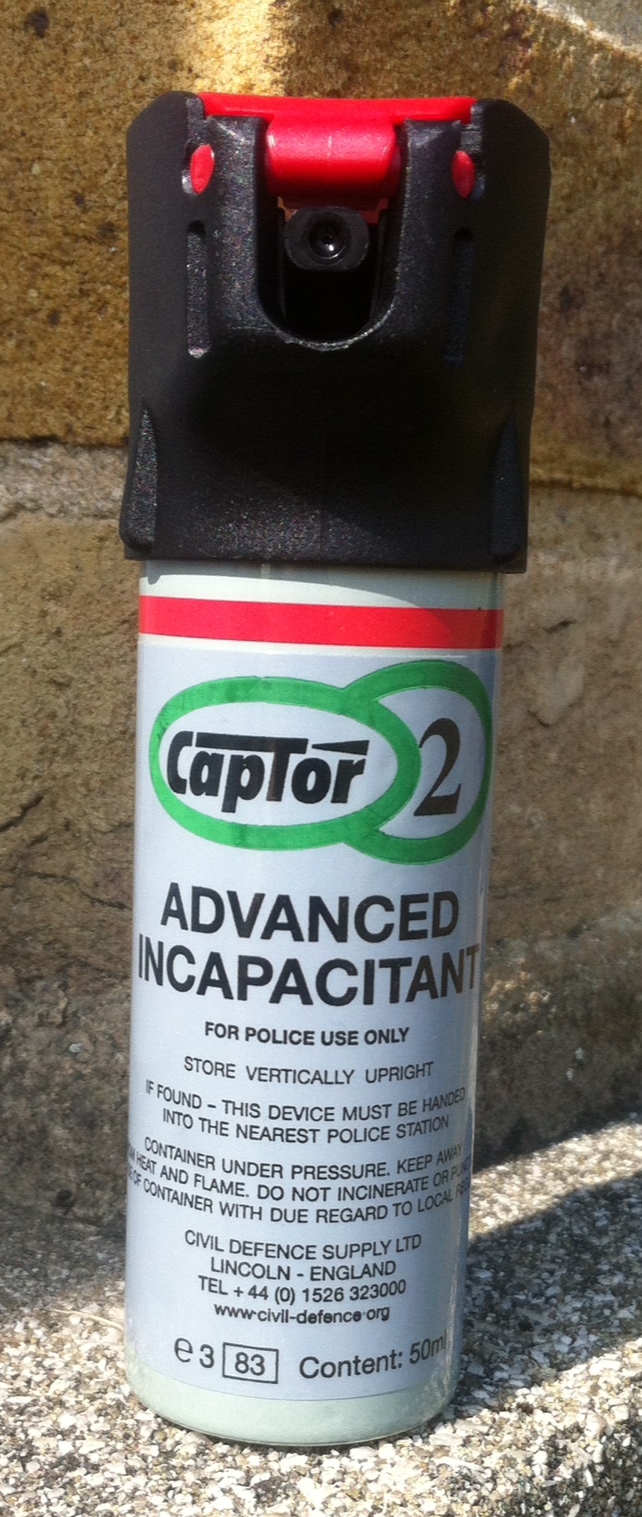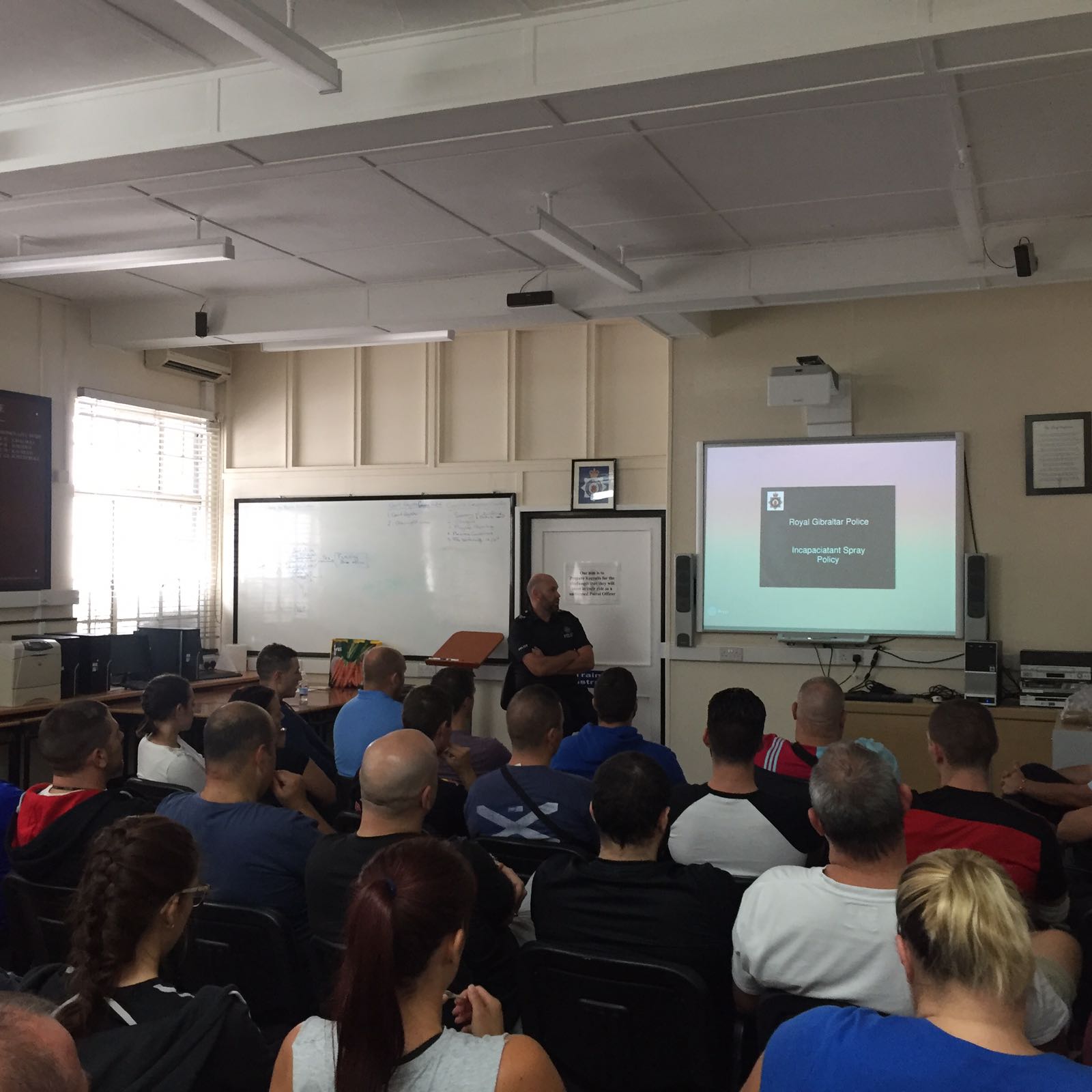Nov 01 - RGP Introduces Incapacitant Sprays
 Police restraint and control of detainees is undertaken by various means, and chemical irritant sprays are amongst various “less-lethal” tactical options currently available to UK and other European police forces.
Police restraint and control of detainees is undertaken by various means, and chemical irritant sprays are amongst various “less-lethal” tactical options currently available to UK and other European police forces.
Two types of Incapacitant Spray (IS) are currently approved by the UK Home Office for use, one of which is the Pelargonic Acid Vanillyamide (P.A.V.A) variant.
Following an extensive period of research and consultation with officials in the UK College of Policing and the UK Home Office as the licensing authority, the Royal Gibraltar Police has purchased the “Captor II” P.A.V.A irritant spray for operational carriage by all RGP officers. This variant is already in use by the majority of UK police forces, having first been approved by the Home Office in 2004.
It is a potent sensory stimulant which primarily affects the eyes, causing closure and temporary incapacitation through discomfort, generally lasting between 15-30mins with no requirement for any medical treatment. Its liquid stream is a spray pattern that ensures virtually no cross-contamination to bystanders, as is known to be the case with other “vapour-type” sprays such as CS. Although it has a proven highly effective track record, no Incapacitant Spray is universally effective; therefore, there may be instances where it may prove ineffective against certain individuals. In Gibraltar, the introduction of the irritant spray will complement existing tactical options available to officers (eg batons or firearms) who are faced with violent confrontations, where their personal safety or that of a member of the public is at increased risk.

The “Captor II” P.A.V.A will be deployed against anyone offering a level of violence that cannot be appropriately dealt with by empty hand techniques, and violent offenders where failure to induce immediate incapacitation would increase the risk to all present. It is appropriate for use in crowds or in confined spaces due to the ultra-low cross-contamination risks. Exposure primarily affects the eyes, causing closure and temporary discomfort. These effects will usually stop the person from continuing with their demeanour or attack.
The RGP complies with UK Authorised Professional Practice (APP) which contains information to assist policing, and has drafted local policy procedures covering PAVA irritant sprays, detailing when and how they are used by authorised officers, their maintenance and storage, as well as associated administrative and evidential considerations. Safe storage facilities have been provided within New Mole House.
Training that is already underway covers issues such as reasonable use and justification, having consideration to risk assessments and local legislation provisions governing the use of force. Officers’ training also includes voluntary exposure to the liquid spray through either full contact or via the application of a minor quantity of the solution rubbed on to their eyes. These processes provide officers with enhanced understanding of the irritant’s capabilities, as well as symptoms, recovery, etc.
{fcomment}
Latest News
- Employment Act Amendment “Important, Welcomed and Timely”, Says Unite
- Government Tables Bill to Amend the Employment Act to Guarantee Workers’ Rights in Law
- Victorian Association To Join Gibraltar’s Heritage Week Celebrations
- Domiciliary Care Town Hall – Update
- GTA Reacts To Chamber Of Commerce Statement
- Minster Cortes Addresses Environment Event At The House Of Lords
- May Day 2025 – Delivery Of Public Sector Pay Claim Key For Both The Public And Private Sectors Says Unite
- Chief Minister’s May Day Message
- GGCA Marks May Day 2025: A Stronger Voice For All Workers In Gibraltar
- May Day And Workers Memorial Day Message From Keith Azopardi - Leader Of The Opposition




